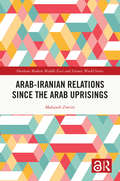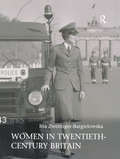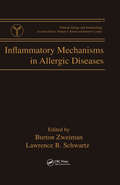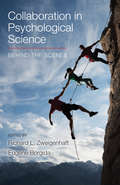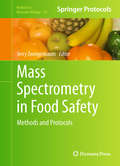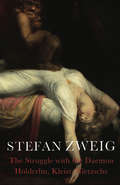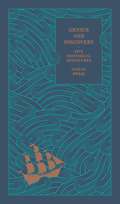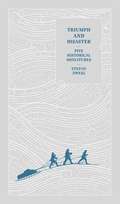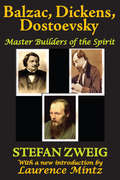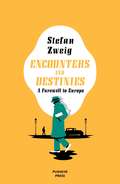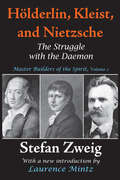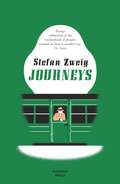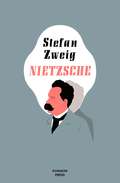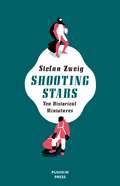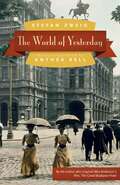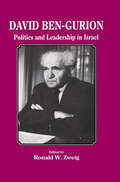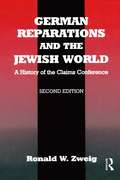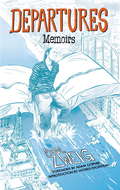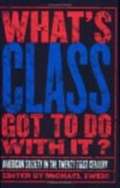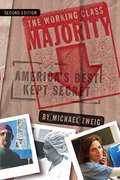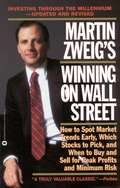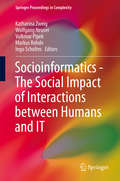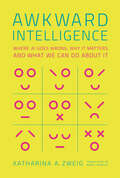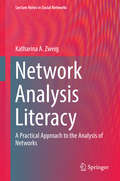- Table View
- List View
Arab-Iranian Relations Since the Arab Uprisings (Durham Modern Middle East and Islamic World Series)
by Mahjoob ZweiriUnlike most writing on Arab-Iran relations, which looks at specific episodes and specific countries, this book, taking a long term view, assesses the overall dynamics of the relationship, discussing in particular how far religion or politics drives the relationship. It argues that although Iran asserts that religion is a key factor underpinning a coherent approach to international relations, in fact what turns out to be the key factor is the politics of particular circumstances and Iran’s specific interests. The book considers Iran’s differing reactions to the Arab uprisings of 2011 onwards, showing that while Iran supported the uprisings in some countries it sided with repressive governments in other countries. The book also examines Iran’s reaction to its own outbreak of popular discontent in 2009 which was controlled by what has been considered as severe repression and explores how Iran is viewed by ordinary people in different Arab countries.Chapter 1 of this book is freely available as a downloadable Open Access PDF at http://www.taylorfrancis.com under a Creative Commons Attribution-Non Commercial-No Derivatives (CC-BY-NC-ND) 4.0 license.
Women in Twentieth-Century Britain: Social, Cultural and Political Change
by Ina Zweiniger-BargielowskaWomen's lives have changed dramatically over the course of the twentieth century: reduced fertility and the removal of formal barriers to their participation in education, work and public life are just some examples. At the same time, women are under-represented in many areas, are paid significantly less than men, continue to experience domestic violence and to bear the larger part of the burden in the domestic division of labour. Women in 2000 may have many more choices and opportunities than they had a hundred years ago, but genuine equality between men and women remains elusive. This unique, illustrated history discusses a wide range of topics organised into four parts: the life course - the experience of girlhood, marriage and the ageing process; the nature of women's work, both paid and unpaid; consumption, culture and transgression; and citizenship and the state.
Inflammatory Mechanisms in Allergic Diseases (Clinical Allergy And Immunology Ser. #Vol. 16)
by Burton Zweiman Lawrence B. SchwartzContains patterns of allergic reactivity for disorders such as asthma, atopic dermatitis, urticaria, and anaphylaxis. Written by leading experts in the field, Inflammatory Mechanisms in Allergic Diseases covers non-anaphylactic drug disorders; synthesis and formation of IgE antibodies; new treatments using allergenic peptides, immunostimulatory oligonucleotides, and pharmacogenomics;recent advances targeting effector mechanisms; hypersensitivity reactions to drugs and more! With over 3100 references, tables, drawings, and micrographs, Inflammatory Mechanisms in Allergic Diseases is an essential reference for allergists, pulmonologists, immunologists, dermatologists, ophthalmologists, otolaryngologists, internists, pediatricians, family practitioners, and medical students in these disciplines.
Collaboration in Psychological Science: Behind the Scenes, First Edition
by Richard L. Zweigenhaft Eugene BorgidaCollaboration in Psychological Science: Behind the Scenes includes 21 essays written by leading social scientists who have collaborated extensively during their careers. The essays look behind the scenes and generate insights about the process of collaboration, offering examples about the pros and cons, best practices, the challenges and benefits, as well as the practical and ethical dilemmas that characterize working collaboratively.
Mass Spectrometry in Food Safety
by Jerry ZweigenbaumAs a key component of human survival, a safe and sufficient food supply is essential for a healthy and productive population throughout the world, so assurance that the food supply is clean and free of harmful substances is a global concern. In Mass Spectrometry in Food Safety: Methods and Protocols, experts in the field provide context to the subject through reviews of regulations in various countries, the current state-of-the art, and specific, detailed scientific methods being employed today. The volume thoroughly covers the key areas in food safety, such as detection of low level chemical residues, pesticide analysis aided by chromatographic techniques, and the revealing of mycotoxins and chemical contaminants from packaging materials. Written in the highly successful Methods in Molecular BiologyTM series format, method chapters contain introductions to their respective topics, lists of the necessary materials and reagents, step-by-step, readily reproducible laboratory protocols, and tips on troubleshooting and avoiding known pitfalls. Pertinent and cutting-edge, Mass Spectrometry in Food Safety: Methods and Protocols serves researchers with both understanding and appreciation for the contribution of mass spectrometry and its vital application to food testing and food safety.
Sketchy Santas
by Will ZweigartHo, ho, huh?Who's that excessively jolly fellow with the fake beard, shifty eyes, sweaty hands, and boozy breath? Why, it's not just Santa but sketchy Santa! Yes, 'tis the season for awkward photos of small children posed precariously on the laps of some of the most clownish, irritable, and just plain weird-looking Santa wannabes--guys you'd give a wide berth to if you passed them on the street.Inside this painfully hilarious collection of holiday photos, you'll discover the pop culture history of the sketchy Santa, and how to identify sketchy Santas in shopping malls everywhere . . . making this the perfect gift for anyone who understands that "He sees you when you're sleeping" is a deeply disturbing thought.
The Struggle with the Daemon
by Stefan Zweig Cedar Paul Eden PaulThe Struggle with the Daemon is a brilliant analysis of the European psyche by the great novelist and biographer Stefan Zweig. Zweig studies three giants of German literature and thought: Friedrich Ho¨lderlin, Heinrich von Kleist and Friedrich Nietzsche - powerful minds whose ideas were at odds with the scientific positivism of their age; troubled spirits whose intoxicating passions drove them mad but inspired them to great works. In their struggle with their inner creative force, Zweig reflects the conflict at the heart of the European soul - between science and art, reason and inspiration.Both highly personal and philosophically wide-ranging, this is one of the most fascinating of Zweig's renowned biographical studies.From the Trade Paperback edition.
Genius and Discovery: Five Historical Miniatures
by Stefan Zweig Anthea BellOne of two beautifully designed hardback gift editions of Stefan Zweig's breathlessly dramatic historical sketches, out in time for the holidays.Millions of people in a nation are necessary for a single genius to arise, millions of tedious hours must pass before a truly historic shooting star of humanity appears in the sky.Five vivid dramatizations of some of the most pivotal episodes in human history, from the Discovery of the Pacific to the composition of the Marseillaise, bringing the past to life in brilliant technicolor.Included in this collection:"Flight into Immortality": Vasco Núñez de Balboa's quest to be the first European to see the Pacific Ocean. "The Resurrection of George Frederic Handel": Handel falls into depression until a poet sends him an inspirational work."The Genius of a Night": Captain Rouget writes La Marseillaise, the song which is to become the French national anthem."The Discovery of El Dorado": John Sutter founds New Helvetia in western America and attempts to keep it."The First Word to Cross the Ocean": Cyrus W. Field resolves to lay the first trans-Atlantic telegraph cable.
Triumph and Disaster: Five Historical Miniatures
by Stefan Zweig Anthea BellOne of two beautifully designed hardback gift editions of Stefan Zweig's breathlessly dramatic historical sketches, out in time for Christmas.A single Yes, a single No, a Too Soon or a Too Late makes that hour irrevocable for hundreds of generations while deciding the life of a single man or woman, of a nation, even the destiny of all humanity.Five vivid dramatizations of some of the most pivotal episodes in human history, from the Fall of Constantinople to Scott's doomed attempt to reach the South Pole, bringing the past to life in brilliant technicolor.Included in this collection:"The Field of Waterloo": A fascinating little known story of Napoleon's defeat."The Race to Reach the South Pole": The failed expedition of the English to discover the South Pole first."The Conquest of Byzantium": Sultan Mahomet's defeat of Byzantium through a neglected door."The Sealed Train": Lenin's triumphant return from exile."Wilson's Failure": The Treaty of Versailles is signed.
Balzac, Dickens, Dostoevsky: Master Builders of the Spirit
by Stefan ZweigWritten over a period of twenty-five years, this first volume in a trilogy is intended to depict in the life and work of writers of different nationalities--Balzac, Dickens, and Dostoevsky--the world-portraying novelist. Though these essays were composed at fairly long intervals, their essential uniformity has prompted Zweig to bring these three great novelists of the nineteenth century together; to show them as writers who, for the very reason that they contrast with each other, also complete one another in ways which makes them round our concept of the epic portrayers of the world.Zweig considers Balzac, Dickens, and Dostoevsky the supremely great novelists of the nineteenth century. He draws between the writer of one outstanding novel, and what he terms a true novelist--an epic master, the creator of an almost unending series of pre-eminent romances. The novelist in this higher sense is endowed with encyclopedic genius, is a universal artist, who constructs a cosmos, peopling it with types of his own making, giving it laws of gravity that are unique to these fi gures.Each of the novelists featured in Zweig's book has created his own sphere: Balzac, the world of society; Dickens, the world of the family; Dostoevsky, the world of the One and of the All. A comparison of these spheres serves to prove their diff erences. Zweig does not put a valuation on the differences, or emphasize the national element in the artist, whether in a spirit of sympathy or antipathy. Every great creator is a unity in himself, with its own boundaries and specifi c gravity. There is only one specifi c gravity possible within a single work, and no absolute criterion in the sales of justice. This is the measure of Zweig, and the message of this book.
Encounters and Destinies: A Farewell to Europe
by Stefan ZweigA new collection of essays by Stefan Zweig: tributes to the great artists and thinkers of the Europe of his dayStefan Zweig was one of the twentieth century's greatest authors and a tireless champion of freedom, tolerance and friendship across borders. Encounters and Destinies collects his most impassioned and moving tributes to his many illustrious friends and peers: literary, philosophical and artistic luminaries from across the Old Europe that Zweig loved so much, and which he grieved to see so cruelly destroyed by two world wars.Including pieces on Rainer Maria Rilke, Marcel Proust, Sigmund Freud, Maxim Gorky and Arturo Toscanini, this essential collection is also Zweig's tribute to the ideal of friendship: an ideal he clung to as the world he knew was torn apart.
Holderlin, Kleist, and Nietzsche: The Struggle with the Daemon
by Stefan ZweigThis is the second volume in a trilogy in which Stefan Zweig builds a composite picture of the European mind through intellectual portraits selected from among its most representative and influential figures. In 'Hoelderlin, Kleist, and Nietzsche', Zweig concentrates on three giants of German literature to portray the artist and thinker as a figure possessed by a powerful inner vision at odds with the materialism and scientific positivism of his time, in this case, the nineteenth century. Zweig's subjects here are respectively a lyric poet, a dramatist and writer of novellas, and a philosopher. Each led an unstable life ending in madness and/or suicide and not until the twentieth century did each make their full impact. Whereas the nineteenth-century novel is socially capacious in terms of subject and audience, the three figures treated here are prophets or forerunners of modernist ideas of alienation and exile. Hoelderlin and Kleist consciously opposed the worldly harmoniousness of Goethe's classicism in favor of a visionary inwardness and dramatisation of the subjective psyche. Nietzsche set himself as a destroyer and rebuilder of philosophy and critic of the degradation of the German spirit through nationalism and militarism. Zweig's choice of subjects reflects a division in his own soul. The image of Goethe recurs here as the ultimate upholder of Zweig's own ideals: scientist and artist, receptive to world culture, supremely rational and prudent. Yet Zweig was aware that Hoelderlin, Kleist, and Nietzsche were more daring explorers of the dangerous and destructive aspects of man that needed to be seen and comprehended in the clarifying light of poetry and philosophy.
Journeys (Modern Voices Ser.)
by Stefan ZweigA collection of the great writer's observations, made during his travels across the Europe he loved so muchWhen I am on a journey, all ties suddenly fall away. I feel myself quite unburdened, disconnected, free - There is something in it marvellously uplifting and invigorating. Whole past epochs suddenly return: nothing is lost, everything still full of inception, enticement.For the insatiably curious and ardent Europhile Stefan Zweig, travel was both a necessary cultural education and a personal balm for the depression he experienced when rooted in one place for too long. He spent much of his life weaving between the countries of Europe, visiting authors and friends, exploring the continent in the heyday of international rail travel.Comprising a lifetime's observations on Zweig's travels in Europe, this collection can be dipped into or savoured at length, and paints a rich and sensitive picture of Europe before the Second World War.
Nietzsche: The Struggle With The Daemon (Master Builders Of The Spirit Ser.)
by Stefan ZweigA scintillating biographical study of the one of the greatest philosophers of the nineteenth century, by one of the bestselling writers of the twentieth.In this vivid biography, Zweig eschews traditional academic discussion and focuses on Nietzsche's habits, passions and obsessions. This work, concentrating on the man rather than the work, on the tragedy of his existence and his apartness from the world in which he moved in enforced isolation, is a tour de force, drawing the reader inexorably into Nietzsche's tragic trajectory.Illustrated with numerous photographs relating to Nietzsche and his European locations, this superb translation by Will Stone is essential reading for anyone interested in Nietzsche, Zweig, first-class biographies and philosophy.
Shooting Stars: Ten Historical Miniatures
by Stefan ZweigTen turning points in history, vividly sketched by the great Stefan Zweig "Such dramatically concentrated, such fateful hours, in which a timeless decision hangs on a single date, a single hour, even just a single minute, rarely occur in everyday life, and only rarely in the course of history. " One of the twentieth century's great humanists and a hugely popular fiction writer, Stefan Zweig's historical works bring the past to life in brilliant Technicolor. This collection contains ten typically breathless and erudite dramatizations of some of the most pivotal episodes in human history. From General Grouchy's failure to intervene at Waterloo, to the miraculous resurrection of George Frideric Handel, this, Stefan Zweig's selection of historical turning points, newly translated by Anthea Bell, is idiosyncratic, fascinating and as always hugely readable.
The World of Yesterday
by Stefan ZweigThis book recalls the golden age of literary Vienna―its seeming permanence, its promise, and its devastating fall. <p><p> Surrounded by the leading literary lights of the epoch, Stefan Zweig draws a vivid and intimate account of his life and travels through Vienna, Paris, Berlin, and London, touching on the very heart of European culture. His passionate, evocative prose paints a stunning portrait of an era that danced brilliantly on the edge of extinction. This new translation by award-winning Anthea Bell captures the spirit of Zweig’s writing in arguably his most revealing work.
David Ben-Gurion: Politics and Leadership in Israel
by Ronald W ZweigFirst published in 2004. It may well be that genius begins where fear ends: not to be afraid to question what is known, not to be afraid to be original. David Ben-Gurion did not try to imitate anyone...He was endowed with a mind that sought out whats was new and was capable of penetrating the deepest recesses. First and foremost, he challenged every Jew who believed it was the fate of Jews to live in the Diaspora, and he believed that the Jews could be a nation of farmers, industrialists, soldiers, pioneers, and not only scientists and intellectuals. He decided that the time had come to establish a Jewish state, yet once it had been founded, he was not satisfied- it must be an exemplary state, a chosen state.
German Reparations and the Jewish World: A History of the Claims Conference
by Ronald W. ZweigGerman Reparations and the Jewish World" has become a standard reference work since it was first published. Based extensively on archival sources, the author examines the difficult debate within the Jewish world whether it was possible to reach a material settlement with Germany so soon after Auschwitz. Concentrating on how the money was spent in rebuilding Jewish life, he also analyzes how the reparations payments transformed the relations bteween Israel and the diaspora, and between different Jewish political and ideological groups. This revised and expanded edition includes material on sensitive relief programmes from archives that have only recently been opened to researchers. In a new, extensive introductory essay the author reexamines the reparations, restitution and indemnification processes from the perspective of 50 years later.
Departures
by Paul Zweig Adam GopnikDepartures is Paul Zweig's celebration of life and love. Zweig thought of himself as a sojourner, a contemporary Wandering Jew, a man with "a loose wire in his genes." He led a number of distinct lives: as a Jewish child in Brooklyn and on a farm in the Catskills; as a literature student at Columbia; as a young exile who spent a decade in Paris transforming himself into a French intellectual, absorbing the language, sex, culture, and leftist politics; and as an American man-of-letters who produced a steady stream of poems, essays, and wide-ranging works of literary scholarship and criticism. In 1978, at the age of forty-three, he abruptly entered a new life--"the life of the dying"--which he inhabited for the next six years. His writing was guided by a steely determination to hold the more pressing and distorting sentiments-- self-pity, regret, anger, fear--at bay for the sake of his lucidity, which became his way through the world of cancer. This memoir stands as a testament to the passion and spirit with which Zweig lived and to the dignity that he brought to his final years.
What's Class Got to Do With It?: American Society in the Twenty-First Century
by Michael ZweigThe contributors to this volume argue that class identity in the United States has been hidden for too long. Their essays, published here for the first time, cover the relation of class to race and gender, to globalization and public policy, and to the lives of young adults. They describe how class, defined in terms of economic and political power rather than income, is in fact central to Americans' everyday lives. What's Class Got to Do with It? is an important resource for the new field of working class studies.
The Working Class Majority
by Michael ZweigIn this memoir of the Hudson River and of her family, Susan Fox Rogers writes from a fresh perspective: the seat of her kayak. Low in the water, she explores the bays and the larger estuary, riding the tides, marveling over sturgeons and eels, eagles and herons, and spotting the remains of the ice and cement industries. After years of dipping her paddle into the waters off the village of Tivoli, she came to know the rocks and tree limbs, currents and eddies, mansions and islands so well that she claimed that section of the river as her own: her reach. Woven into Rogers's intimate exploration of the river is the story of her life as a woman in the outdoors¿rock climbing and hiking as well as kayaking. Rogers writes of the Hudson River with skill and vivacity. Her strong sense of place informs her engagement with a waterway that lured the early Dutch settlers, entranced nineteenth-century painters, and has been marked by decades of pollution. The river and the communities along its banks become partners in Rogers's life and vivid characters in her memoir. Her travels on the river range from short excursions to the Saugerties Lighthouse to a days-long journey from Tivoli to Tarrytown and a circumnavigation of Manhattan Island, while in memory she ventures as far as the Indiana Dunes and the French Pyrenees. In a fluid, engaging voice, My Reach mixes the genres of memoir, outdoor adventure, natural and unnatural history. Rogers's interest in the flora and fauna of the river is as keen as her insight into the people who live and travel along the waterway. She integrates moments of description and environmental context with her own process of grieving the recent deaths of both parents. The result is a book that not only moves the reader but also informs and entertains.
Winning on Wall Street
by Martin Zweig Morrie GoldfischerThe bestselling classic by one of the nation's most respected stock market forecasters has been fully revised and updated to take investors into the new millennium. "Martin Zweig is the hottest, most respected stock picker in the land".--"Philadelphia Inquirer".
Socioinformatics - The Social Impact of Interactions between Humans and IT
by Katharina Zweig Wolfgang Neuser Volkmar Pipek Markus Rohde Ingo ScholtesSocioinformatics is a new scientific approach to study the interactions between humans and IT. These proceedings are a collection of the contributions during a workshop of the Gesellschaft für Informatik (GI). Researchers in this emerging field discuss the main aspects of interactions between IT and humans with respect to; social connections, social changes, acceptance of IT and the social conditions affecting this acceptance, effects of IT on humans and in response changes of IT, structures of the society and the influence of IT on these structures, changes of metaphysics influenced by IT and the social context of a knowledge society.
Awkward Intelligence: Where AI Goes Wrong, Why It Matters, and What We Can Do about It
by Katharina A. ZweigAn expert offers a guide to where we should use artificial intelligence—and where we should not.Before we know it, artificial intelligence (AI) will work its way into every corner of our lives, making decisions about, with, and for us. Is this a good thing? There&’s a tendency to think that machines can be more &“objective&” than humans—can make better decisions about job applicants, for example, or risk assessments. In Awkward Intelligence, AI expert Katharina Zweig offers readers the inside story, explaining how many levers computer and data scientists must pull for AI&’s supposedly objective decision making. She presents the good and the bad: AI is good at processing vast quantities of data that humans cannot—but it&’s bad at making judgments about people. AI is accurate at sifting through billions of websites to offer up the best results for our search queries and it has beaten reigning champions in games of chess and Go. But, drawing on her own research, Zweig shows how inaccurate AI is, for example, at predicting whether someone with a previous conviction will become a repeat offender. It&’s no better than simple guesswork, and yet it&’s used to determine people&’s futures. Zweig introduces readers to the basics of AI and presents a toolkit for designing AI systems. She explains algorithms, big data, and computer intelligence, and how they relate to one another. Finally, she explores the ethics of AI and how we can shape the process. With Awkward Intelligence. Zweig equips us to confront the biggest question concerning AI: where we should use it—and where we should not.
Network Analysis Literacy
by Katharina A. ZweigThis book presents a perspective of network analysis as a tool to find and quantify significant structures in the interaction patterns between different types of entities. Moreover, network analysis provides the basic means to relate these structures to properties of the entities. It has proven itself to be useful for the analysis of biological and social networks, but also for networks describing complex systems in economy, psychology, geography, and various other fields. Today, network analysis packages in the open-source platform R and other open-source software projects enable scientists from all fields to quickly apply network analytic methods to their data sets. Altogether, these applications offer such a wealth of network analytic methods that it can be overwhelming for someone just entering this field. This book provides a road map through this jungle of network analytic methods, offers advice on how to pick the best method for a given network analytic project, and how to avoid common pitfalls. It introduces the methods which are most often used to analyze complex networks, e. g. , different global network measures, types of random graph models, centrality indices, and networks motifs. In addition to introducing these methods, the central focus is on network analysis literacy - the competence to decide when to use which of these methods for which type of question. Furthermore, the book intends to increase the reader's competence to read original literature on network analysis by providing a glossary and intensive translation of formal notation and mathematical symbols in everyday speech. Different aspects of network analysis literacy - understanding formal definitions, programming tasks, or the analysis of structural measures and their interpretation - are deepened in various exercises with provided solutions. This text is an excellent, if not the best starting point for all scientists who want to harness the power of network analysis for their field of expertise.
